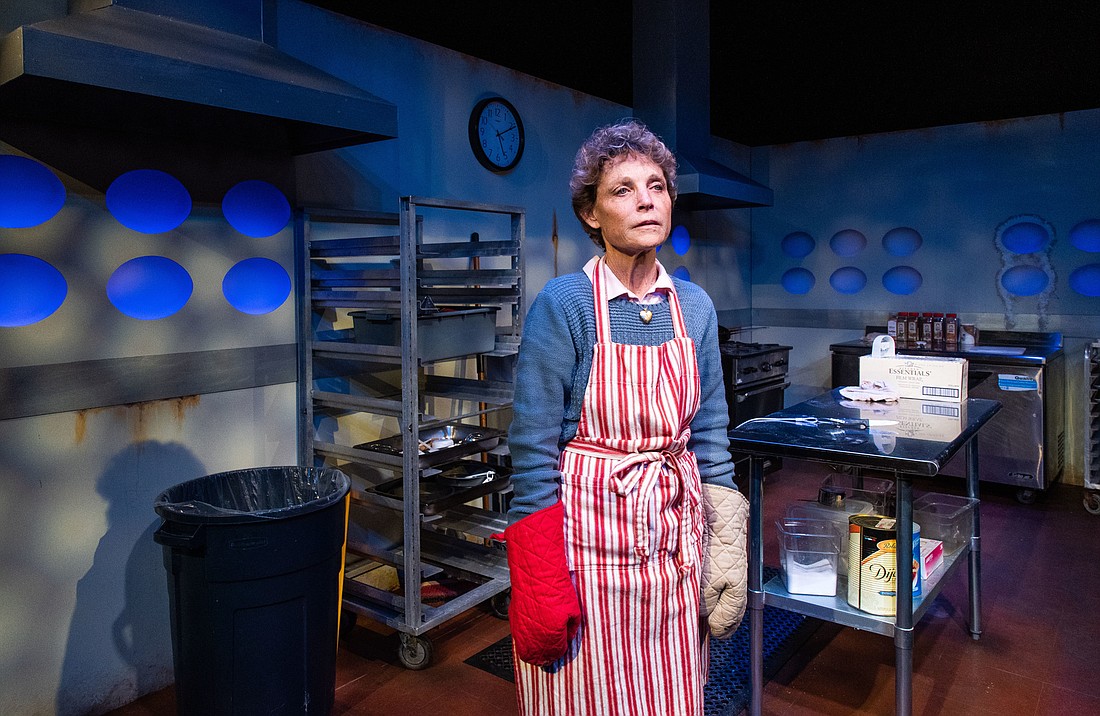- January 4, 2025
-
-
Loading

Loading

An actor’s journey is never easy. Or predictable. Especially in a one-person play.
Take Roxanne Fay. She’s making an imaginary pie while talking to an invisible friend.
“You have to allow the proper time to make a pie,” she says. “There’s no rushing, no skipping steps.”
Fay picks up a bowl, mimes the action of mixing up ingredients.
“Everything is done for a reason, in order, for a particular amount of time,” she says. “If you follow the rules, you will get a perfect pie.”
This cooking lesson unfolds at a rehearsal at Urbanite Theatre. Three things are going on. Fay’s character is telling a story, she’s reacting to her memories as she tells it, and she’s making a pie.
Fay’s miming that action now. She’ll be baking an actual pie during each performance. The set is a stark, institutional kitchen. Nothing fancy, but it’s got all the basics. Range, stove, refrigerator. Evidently they work.
The actor talks about family ritual, an ancient apple tree, better days. Everyday stuff. But you feel the weight of what she isn’t saying.
This scene is a slice of Jennifer Fawcett’s “Apples in Winter.” Fay’s character is Miriam. Her son is a brutal murderer. He’s been in prison for 20 years. She’s making the pie for him in the prison kitchen. That’s the family ritual. Year after year, Miriam’s been keeping it up throughout his stay.
It’s a heavy play. And there’s a lot of weight on Fay’s shoulders. In a typical production, each actor is part of a larger cast. They can bounce off the other actors, and that makes the job easier. “Acting is reacting,” as acting teachers like to say. Obviously, that’s not an option in a one-person show. Fay is on her own. But not really.
Director Kirstin Franklin has shared her actor’s journey to discover who Miriam is.
Physically, Fay had to isolate Miriam’s specific speech patterns, physical quirks and the way she moves and walks. Internally, she had to know how her character thinks.
What’s the meaning of this tragedy? That was the second question. As The Old Testament’s Job discovered, it’s probably unanswerable. But Miriam still tries to find an answer.
“Apples in Winter” takes the form of storytelling. Miriam is making a pie in a prison kitchen and telling her sad tale. She tries to make sense of her son’s senseless crime. Why did he do it? She talks about her son’s addiction, what was going through his head, and what she did wrong.
Who is she talking to? The script doesn’t say.
“I want to keep it real, and that’s tough in a one-person play,” Fay says. “If you’re not careful, it can sound like a therapy session. Why am I telling this story? Who am I speaking to? Knowing who led me to why. That keeps me grounded.”
Fawcett’s play has no political agenda, left or right. Capital punishment, permissive child rearing — they don’t come up.
The point is empathy. Walking a mile in the character’s shoes.
“Film and theater typically deal with the victims and perpetrators of tragedies,” says Franklin. “They rarely explore the collateral damage to the victims’ families — and almost never deal with the families of the perpetrators.”
Franklin has been close to that damage. Too close for comfort.
“My parents knew Dylan Klebold’s parents,” she says, referring to one of the two 1999 Columbine High shooters. “They were normal churchgoing, career people. The aftermath of the shooting tore them part.”
“It’s easy to judge,” says Fay. “And that’s what people do.”
Franklin nods.
“The weight of a child’s crime usually falls on the parents,” she says. “Armchair psychiatrists are always quick to judge. What was wrong with the home life?”
“And the parents judge themselves,” adds Fay. “Miriam does that throughout the play.”
“But life goes on,” says Franklin. “Or the empty shell of a life. Miriam’s happy life is over.”
What keeps her going?
“The play doesn’t address that directly,” says Fay. “Miriam just does. The playwright doesn’t explain how or why. But she makes you feel what Miriam’s going through.”
Empathy. In this case, for the mother of a murderer.
“Apples in Winter” asks you to imagine it. And expand your circle of caring, empathy and compassion in the process.
According to Franklin, that’s what good theater does.
“Theater is live and unfiltered,” Franklin says. “There’s no screen — no barrier between you and the actor. You’re in a dark room, and that gives you permission to feel without being judged. You can cry — and no one will ask why.”